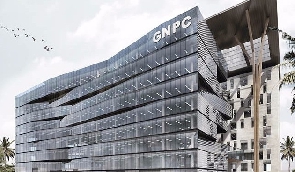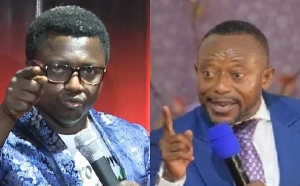- Home - News
- TWI News | TV
- Polls
- Year In Review
- News Archive
- Crime & Punishment
- Politics
- Regional
- Editorial
- Health
- Ghanaians Abroad
- Tabloid
- Africa
- Religion
- Election 2020
- Coronavirus
- News Videos | TV
- Photo Archives
- News Headlines
- Press Release
Opinions of Thursday, 9 August 2018
Columnist: Richard Obeng Mensah
Lack of due diligence in energy deals in Ghana and its implications on ‘dumsor’
President Akufo-Addo on 6th August 2018 relived his Minister of Energy, Mr Boakye Agyarko, of his position. Although the Communication Directorate of the Government did not assign any specific reason to Mr Agyarko’s immediate sacking, the dismissal is certainly connected to the controversial renegotiated AMERI deal.
Some experts and stakeholders in the energy industry have hailed the president’s decision and are calling for a further showdown in the Ministry of Energy, including possible dismissal of the three Deputy Ministers of Energy.
The former minister and his team reviewed and renamed the $510 million 2015 AMERI deal as the Novated and Amended AMERI deal.
The Akufo-Addo government promised to review the original deal which was entered into by the Mahama administration in 2015 because it was allegedly over-priced by $150 million. For Emmanuel Kuyole, Executive Director for the Centre for Extractives and Development Africa (CEDA), “the restructuring of the arrangement was riddled with errors”.
The botched reviewed AMERI deal which has undoubtedly brought a lot of embarrassment on the people and Government of Ghana, caused the latter to withdraw it from Parliament. Nevertheless, the lack of due diligence in relation to the AMERI saga has wide implications on reliable electricity supply in Ghana.
The AMERI saga once again raises questions about lack of due diligence on the part of some African leaders in relation to international energy agreements. The relevant case that comes to mind is the Attorney-General v Faroe Atlantic Co. Ltd.
The facts of the Faroe case are that on 24th July 1998, the plaintiffs-respondents (Faroe Atlantic Co. Ltd) entered into a Power Purchase Agreement (PPA) with the Government of Ghana for the purchase of electric power.
The plaintiffs alleged a breach of the agreement and sued the Attorney-General, representing the Government of Ghana, in the High Court, Accra and claimed specific performance or in the alternative damages for breach of contract. The plaintiffs on 8th September 1998 applied for summary judgement and the trial High Court entered final judgement against the defendant for the reliefs endorsed on the writ of summons. The defendant did not appeal against the judgement.
The trial High Court on 18th September 2001, subsequent to a motion filed by the plaintiffs on 8th September 1998 to enforce the summary judgment, gave judgment to the plaintiffs in the sum of US$6,298,354 as damages plus interest and an assessed damage of ¢100,000,000.
The trial court also ordered the plaintiffs to refund an advance payment of US$855,000 paid by the Government of Ghana under the agreement. The defendant appealed to the Court of Appeal but the appeal was dismissed. The Court of Appeal affirmed the trial court’s decision to hear the evidence on damages and confirmed the award of damages.
The defendant on 23rd September 2003 appealed to the Supreme Court and questioned the legality of the summary judgement entered against it and the subsequent damages founded on the summary judgment.
Counsel for the defendant argued that the PPA, although validly concluded, was void for non-compliance with article 181of the 1992 Constitution. The Court unanimously allowed the appeal and held that the contract was unconstitutional and void for non-compliance with article 181 which requires the Government of Ghana to lay before Parliament all international business loan agreements of which the Government is a party.
Likewise, the ranging AMERI saga, the conduct of the Government of Ghana in the Faroe case has adverse implications on private investment in Ghana’s power sector and power crisis (‘dumsor’) in the country. The Government’s lack of due diligence, culminating in its failure to comply with the requirements of article 181(1)-(2) in the Faroe case, wrongfully postulates that a private investor in Ghana’s power sector risks losing his investment if the Government fails to exhaust all processes necessary to constitutionally validate an agreement under article 181(5).
In addition to the lack of due diligence, the Faroe case took seven years to decide; from the filing of the writ in the High Court to the determination of the appeal by the Supreme Court. The case unnecessarily suffered series of adjournments at the High Court. The needless delay, coupled with the Government’s lack of due diligence and the oxymoronic decision of the Supreme Court, do not enhance investor confidence in Ghana’s power sector.
Ghana has had five major power crises since 1984 despite several reforms in its power sector.
Ghana is among the top 10 countries in the world that have experienced and continue to experience crippling load shedding.
One of the root causes of this trend in Ghana is the failure to invest in the power sector; more particularly investment in electricity infrastructure. Ghana’s inadequate power supply infrastructure is also due to failure to sustain power sector investment programmes.
Sub-Saharan Africa’s energy use has risen by 45% since 2000 due to rapid economic growth.
Many of its governments have thus intensified their efforts to tackle the numerous regulatory and political barriers that hold back investment in domestic energy supply. An estimated US$40.8 billion a year in investments is needed for Africa’s power sector and the private sector is expected to play a significant role in closing the demand-resources gap by providing funds and expertise.
Ghana’s total capital investment is estimated at US$4.3-5.4 billion for the period 2006-2020 with investment in its electricity subsector taking over 70% of the total amount.
However, regulatory impediments and risks, among other factors, impede private investment in energy infrastructure in most developing African countries such as Ghana.
Ghana should thus hasten slowly and carefully with the botched AMERI deal to enhance private-investor confidence in the power sector.
The writer is a certified life and leadership coach, a legal academic, and a prolific author of 7 books and over 200 articles. Blog: www.richard-obeng-mensah.blogspot.com










